COP29: Azerbaijan Launches Climate Fund, Shelves Fossil Fuel Levy
Azerbaijan, COP29 host, launches a new climate fund to invest in developing countries, shelving a planned fossil fuel levy. The fund aims to raise USD 1 billion annually from fossil fuel producers, facing criticism for not holding the industry accountable.
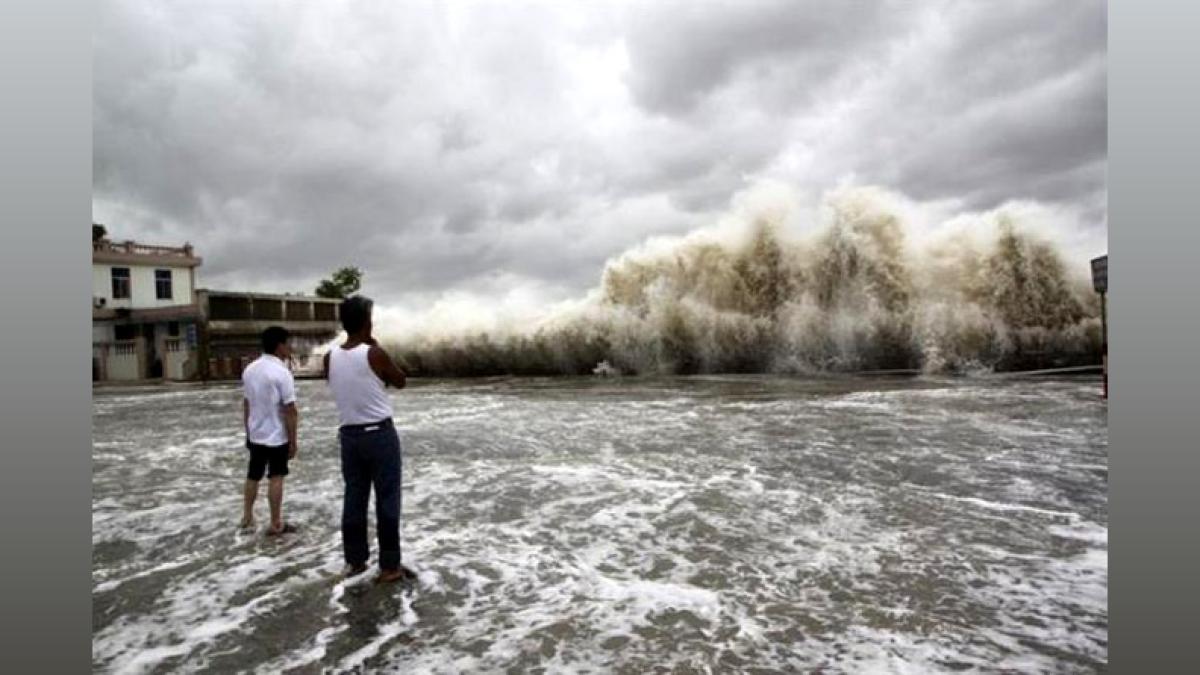
New Delhi, Jul 20 (PTI) Azerbaijan, the host of this year's UN climate talks, has shelved a planned levy on fossil fuel production and instead launched a fund to "invest" in climate action in developing countries.
Reports suggest that Azerbaijan, which relies heavily on oil and gas revenues, faced resistance from some oil- and gas-producing Gulf countries regarding the planned levy announced in May.
The new fund, the "Climate Finance Action Fund" (CFAF), will receive annual contributions from fossil fuel-producing countries and companies. Initial fundraising aims for USD 1 billion, with members committing to annual contributions as fixed sums or based on production volume, according to a statement.
Based in the capital city of Baku, the fund will target climate projects in developing countries, meeting the next generation of national climate plans to limit global warming to 1.5 degrees Celsius, and addressing the consequences of climate change-fuelled disasters.
Financial support to help middle-income and poor countries fight climate change will be at the centre of the UN climate conference in Baku, where the world will reach the deadline to agree on the New Collective Quantified Goal (NCQG) the new amount developed nations must mobilise every year starting 2025 to support climate action in developing countries.
But achieving consensus will not be easy, given the disappointing progress made on the issue at the mid-year UN Climate talks in Bonn, Germany.
The COP29 presidency said 50 per cent of the capital will go to climate projects in developing countries, focusing on clean energy, energy efficiency, climate resilience, and new technologies.
The remaining half will help meet members' NDCs to keep the 1.5-degree-Celsius target within reach. Twenty per cent of revenues will be directed to a Rapid Response Funding Facility for immediate, highly concessional, and grant-based disaster response support.
"This facility will offer immediately accessible funding to address the consequences of natural disasters in Small Island Developing States, Least Developed Countries, and other vulnerable developing communities," the statement said.
Harjeet Singh, Global Engagement Director for the Fossil Fuel Non-Proliferation Treaty Initiative, said the announcement of a new fund undeniably puts a spotlight on the fossil fuel industry's role in the climate crisis.
"However, its proposed design dangerously grants a social license for the ongoing extraction of gas, oil, and coal. This is far from the robust accountability we have long demanded to hold the fossil fuel industry responsible for denying and delaying climate action.
"The COP29 Presidency's plan for the climate summit this November lacks the ambition to phase out fossil fuels and falls massively short in supporting a just transition for developing nations. True climate justice means holding the fossil fuel industry financially responsible for the destruction it has caused, not facilitating its continued operation under the guise of tiny contributions to climate solutions," he said.
Last year's UN climate conference in Dubai ended with a global agreement calling for transitioning away from fossil fuels to reach net zero emissions by 2050.
In a letter sent to all countries that are signatories to the UN climate change convention earlier this week, Azerbaijan urged for a political push to break the deadlock on the new climate finance goal.
At the 2009 UN climate conference in Copenhagen, rich nations pledged to provide USD 100 billion annually from 2020 to help developing countries mitigate and adapt to climate change. However, delays in achieving this goal have eroded trust between developed and developing nations and have been a continual source of contention during annual climate negotiations.
In May, the Organisation for Economic Co-operation and Development (OECD) claimed that developed countries had met the long-standing USD 100 billion-a-year promise by providing nearly USD 116 billion in climate finance to developing countries in 2022, with nearly 70 per cent of the money given in the form of loans.
However, the international non-profit Oxfam last week said climate finance provided by rich countries in 2022 totalled no more than USD 35 billion.
Developing nations argue they cannot be expected to reduce CO2 emissions faster if developed countries historically responsible for climate change do not provide enhanced financial support. Rich countries are now expected to raise more than USD 100 billion, with developing countries, including India, demanding trillions of dollars to tackle climate change.
Reports suggest that Azerbaijan, which relies heavily on oil and gas revenues, faced resistance from some oil- and gas-producing Gulf countries regarding the planned levy announced in May.
The new fund, the "Climate Finance Action Fund" (CFAF), will receive annual contributions from fossil fuel-producing countries and companies. Initial fundraising aims for USD 1 billion, with members committing to annual contributions as fixed sums or based on production volume, according to a statement.
Based in the capital city of Baku, the fund will target climate projects in developing countries, meeting the next generation of national climate plans to limit global warming to 1.5 degrees Celsius, and addressing the consequences of climate change-fuelled disasters.
Financial support to help middle-income and poor countries fight climate change will be at the centre of the UN climate conference in Baku, where the world will reach the deadline to agree on the New Collective Quantified Goal (NCQG) the new amount developed nations must mobilise every year starting 2025 to support climate action in developing countries.
But achieving consensus will not be easy, given the disappointing progress made on the issue at the mid-year UN Climate talks in Bonn, Germany.
The COP29 presidency said 50 per cent of the capital will go to climate projects in developing countries, focusing on clean energy, energy efficiency, climate resilience, and new technologies.
The remaining half will help meet members' NDCs to keep the 1.5-degree-Celsius target within reach. Twenty per cent of revenues will be directed to a Rapid Response Funding Facility for immediate, highly concessional, and grant-based disaster response support.
"This facility will offer immediately accessible funding to address the consequences of natural disasters in Small Island Developing States, Least Developed Countries, and other vulnerable developing communities," the statement said.
Harjeet Singh, Global Engagement Director for the Fossil Fuel Non-Proliferation Treaty Initiative, said the announcement of a new fund undeniably puts a spotlight on the fossil fuel industry's role in the climate crisis.
"However, its proposed design dangerously grants a social license for the ongoing extraction of gas, oil, and coal. This is far from the robust accountability we have long demanded to hold the fossil fuel industry responsible for denying and delaying climate action.
"The COP29 Presidency's plan for the climate summit this November lacks the ambition to phase out fossil fuels and falls massively short in supporting a just transition for developing nations. True climate justice means holding the fossil fuel industry financially responsible for the destruction it has caused, not facilitating its continued operation under the guise of tiny contributions to climate solutions," he said.
Last year's UN climate conference in Dubai ended with a global agreement calling for transitioning away from fossil fuels to reach net zero emissions by 2050.
In a letter sent to all countries that are signatories to the UN climate change convention earlier this week, Azerbaijan urged for a political push to break the deadlock on the new climate finance goal.
At the 2009 UN climate conference in Copenhagen, rich nations pledged to provide USD 100 billion annually from 2020 to help developing countries mitigate and adapt to climate change. However, delays in achieving this goal have eroded trust between developed and developing nations and have been a continual source of contention during annual climate negotiations.
In May, the Organisation for Economic Co-operation and Development (OECD) claimed that developed countries had met the long-standing USD 100 billion-a-year promise by providing nearly USD 116 billion in climate finance to developing countries in 2022, with nearly 70 per cent of the money given in the form of loans.
However, the international non-profit Oxfam last week said climate finance provided by rich countries in 2022 totalled no more than USD 35 billion.
Developing nations argue they cannot be expected to reduce CO2 emissions faster if developed countries historically responsible for climate change do not provide enhanced financial support. Rich countries are now expected to raise more than USD 100 billion, with developing countries, including India, demanding trillions of dollars to tackle climate change.
You May Like To Read
TODAY'S MOST TRADED COMPANIES
- Company Name
- Price
- Volume
- Vodafone Idea L
- 7.94 ( -1.00)
- 53169786
- GTL Infrastructure
- 1.61 (+ 6.62)
- 32431916
- Spicejet Ltd.
- 53.52 (+ 9.09)
- 18083686
- G G Engineering
- 0.81 ( -3.57)
- 15819052
- Reliance Power L
- 44.37 (+ 1.88)
- 14874542
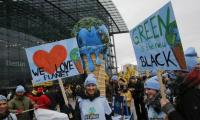
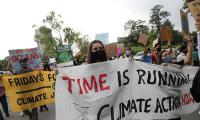
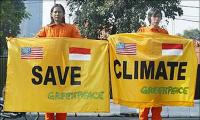

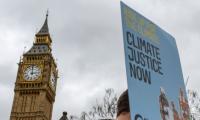


 © 2025 Rediff.com India Limited. All rights reserved.
© 2025 Rediff.com India Limited. All rights reserved.